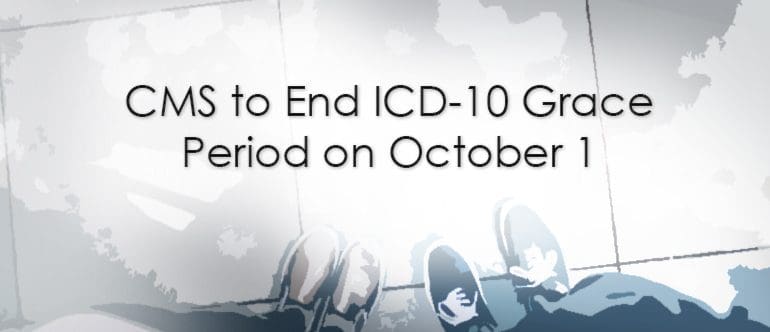Call us toll-free: 800-878-7828 — Monday - Friday — 8AM - 5PM EST

By Rajiv Leventhal for Healthcare Informatics
After announcing last year that it would not deny Medicare physician claims for 12 months as long as the ICD-10 code was “from the right family,” the Centers for Medicare & Medicaid Services (CMS) has said that the grace period for healthcare providers will expire on Oct.1, 2016.
Last July, CMS and the American Medical Association (AMA) announced a joint effort to help physicians get ready ahead of the Oct. 1 deadline. In response to requests from the provider community, CMS released additional guidance to allow for flexibility in the claims auditing and quality reporting process as the medical community gains experience using the new ICD- 10 code set. Specifically, the agency said, “For 12 months after ICD-10 implementation, Medicare review contractors will not deny physician or other practitioner claims billed under the Part B physician fee schedule through either automated medical review or complex medical record review based solely on the specificity of the ICD-10 diagnosis code as long as the physician/practitioner used a valid code from the right family. “
In new guidance released last week, CMS said that it “will not extend ICD-10 flexibilities beyond October 1, 2016. There will be no additional flexibility guidance. The agency also said that Medicare will not phase in the requirement to code to the highest level of specificity. “Providers should already be coding to the highest level of specificity. ICD-10 flexibilities were solely for the purpose of contractors performing medical review so that they would not deny claims solely for the specificity of the ICD-10 code as long as there is no evidence of fraud. As of October 1, 2016, providers will be required to code to accurately reflect the clinical documentation in as much specificity as possible, as per the required coding guidelines,” CMS said in the updated guidance.
For many patient care organizations nationwide, there was much concern leading up to the ICD-10 implementation deadline of Oct. 1, 2015. But for most providers, the dreaded implementation wasn’t so bad after all. Indeed, CMS specifically noted that in the first month of implementation, it received approximately 1,000 inquiries and responded to 100 percent of them within three business days. To this end, one month following the Oct. 1, 2015 implementation date, CMS reported that claims were processing normally, with 10 percent of claims being rejected and only .09 percent rejected due to invalid ICD-10 codes.
And, earlier this year, the Centers for Disease Control and Prevention released roughly 1,900 diagnosis codes that will be added to the ICD-10 coding system for healthcare claims in fiscal year 2017. Some 3,651 new ICD-10 inpatient procedure codes for FY 2017 were also posted in March. The large number of new codes is due to a partial freeze on updates to the ICD-10-CM and ICD-10 PCS codes prior to implementation of ICD-10 on Oct. 1, 2015. Healthcare organizations will have until the Oct. 1, 2016 implementation deadline for the new coding updates.
In the ICD-10 flexibilities Q&A, CMS said that providers can prepare themselves for the end of flexibilities by “avoiding unspecified ICD-10 codes whenever documentation supports a more detailed code. Check the coding on each claim to make sure that it aligns with the clinical documentation,” CMS said. The agency also said that in some cases, unspecified codes have acceptable, even necessary, uses. “While you should report specific diagnosis codes when they are supported by the available medical record documentation and clinical knowledge of the patient’s health condition, in some instances signs/symptoms or unspecified codes are the best choice to accurately reflect the healthcare encounter. You should code each healthcare encounter to the level of certainty known for that encounter,” the guidance stated.
